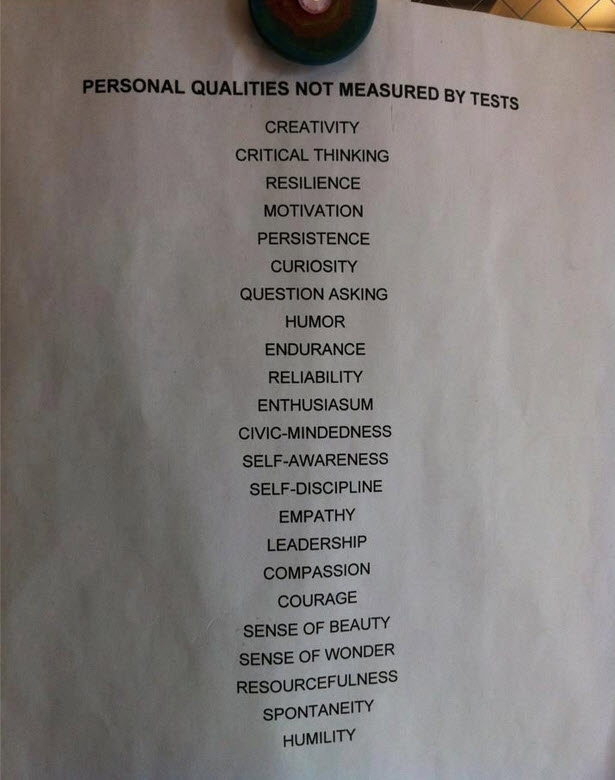Strangers slapping each other
From the film-maker who asked strangers to kiss each other, we now have stingers slapping each other.
From the film-maker who asked strangers to kiss each other, we now have stingers slapping each other.
Here is a well constructed list that those who do well on SAT tests should carefully review.
CREATIVITY
CRITICAL THINKING
RESILIENCE
MOTIVATION
PERSISTENCE
CURIOSITY
QUESTION ASKING
HUMOR
ENDURANCE
RELIABILITY
ENTHUSIASUM
CIVIC-MINDEDNESS
SELF-AWARENESS
SELF-DISCIPLINE
EMPATHY
LEADERSHIP
COMPASSION
COURAGE
SENSE OF BEAUTY
SENSE OF WONDER
RESOURCEFULNESS
SPONTANEITY
HUMILITY
Paul Tough, who wrote How Children Succeed: Grit, Curiosity, and the Hidden Power of Character, would add "grit."

[P]eople understand the world in ways that suit their tribal identities: in controlled experiments both conservatives and liberals systematically misread facts in a way that confirms their biases. And more information doesn't help: people screen out or discount facts that don’t fit their worldview. Politics, as he says, makes us stupid. But here’s the thing: the lived experience is that this effect is not, in fact, symmetric between liberals and conservatives. Yes, liberals are sometimes subject to bouts of wishful thinking. But can anyone point to a liberal equivalent of conservative denial of climate change, or the “unskewing” mania late in the 2012 campaign, or the frantic efforts to deny that Obamacare is in fact covering a lot of previously uninsured Americans? I don’t mean liberals taking positions you personally disagree with — I mean examples of overwhelming rejection of something that shouldn't even be in dispute.
At this point, I tend to agree with Krugman that more conservatives go way off the charts, but I also know many liberals that go way off the charts. Confirmation bias strikes people of all political stripes. When Obama engages in illegal wars, spies on Americans, prosecutes more people under the Espionage Act than all prior presidents combined, most liberals are silent, and even pissed to hear the criticism. I've also heard things like the following from liberals, with my own ears:One possible answer would be that liberals and conservatives are very different kinds of people — that liberalism goes along with a skeptical, doubting — even self-doubting — frame of mind; “a liberal is someone who won’t take his own side in an argument.” Another possible answer is that it’s institutional, that liberals don’t have the same kind of monolithic, oligarch-financed network of media organizations and think tanks as the right.
I played guitar at a local coffee house last night ( Hartford Coffee ) In my haste to pack up to go, I forgot my electronic guitar tuner. Last night, then, I realized how dependent I have become on the tuner. I've played for many decades and, until 5 years ago, tuned by ear. I've fallen out of habit since then because these cheap tuners are incredibly accurate. All you need to do is watch the read-out--you don't even need to hear the guitar while tuning (one of my tuners attaches to the head of the guitar and picks up vibrations). I made it through the night, of course, but I found myself having to focus on what exactly the tuning problem was (which string or strings was out of tune, and which direction). People who don't play stringed instruments don't realize that even when you get the guitar tuned, it might not last for long. Even two songs later, it could require another adjustment. My point is that I had offloaded a skill to an electronic device. This is a common phenomenon these days. A lot of us don't know the phone numbers of our friends--no need to, with smart phones. Many of us are terrible spellers, but no problem, because the word processor will signal problems. My Google calendar and smart phone seem to organize me, rather than me organizing them. I find myself shooting out short texts and emails to get right to it, rather than calling, which requires some social graces--younger folks avoid calls like the plague, it seems. This makes me wonder whether they are thus losing some conversational skills. Robin Dunbar has researched the number of friends we have in our social group (it tends to be close to 150), but people who watch a lot of TV have fewer friends, and they might be losing the skills necessary to maintain a robust social group. This is not a criticism of technology. It can be immensely useful. For instance, I've used Meetup.com to connect with folks with keen interests in photography and urban exploring, people I would never have encountered without technology. My misplaced tuner last night reminded me that we create technology but that technology also changes us, for good and bad.
Sam Harris will soon be writing a book to argue for a legitimate secular use of the word "spiritual." In this article, he points out that many atheists have used the term, pointing out some distinctions along the way.